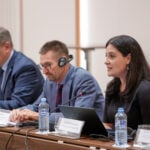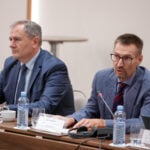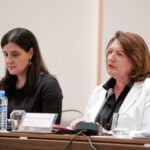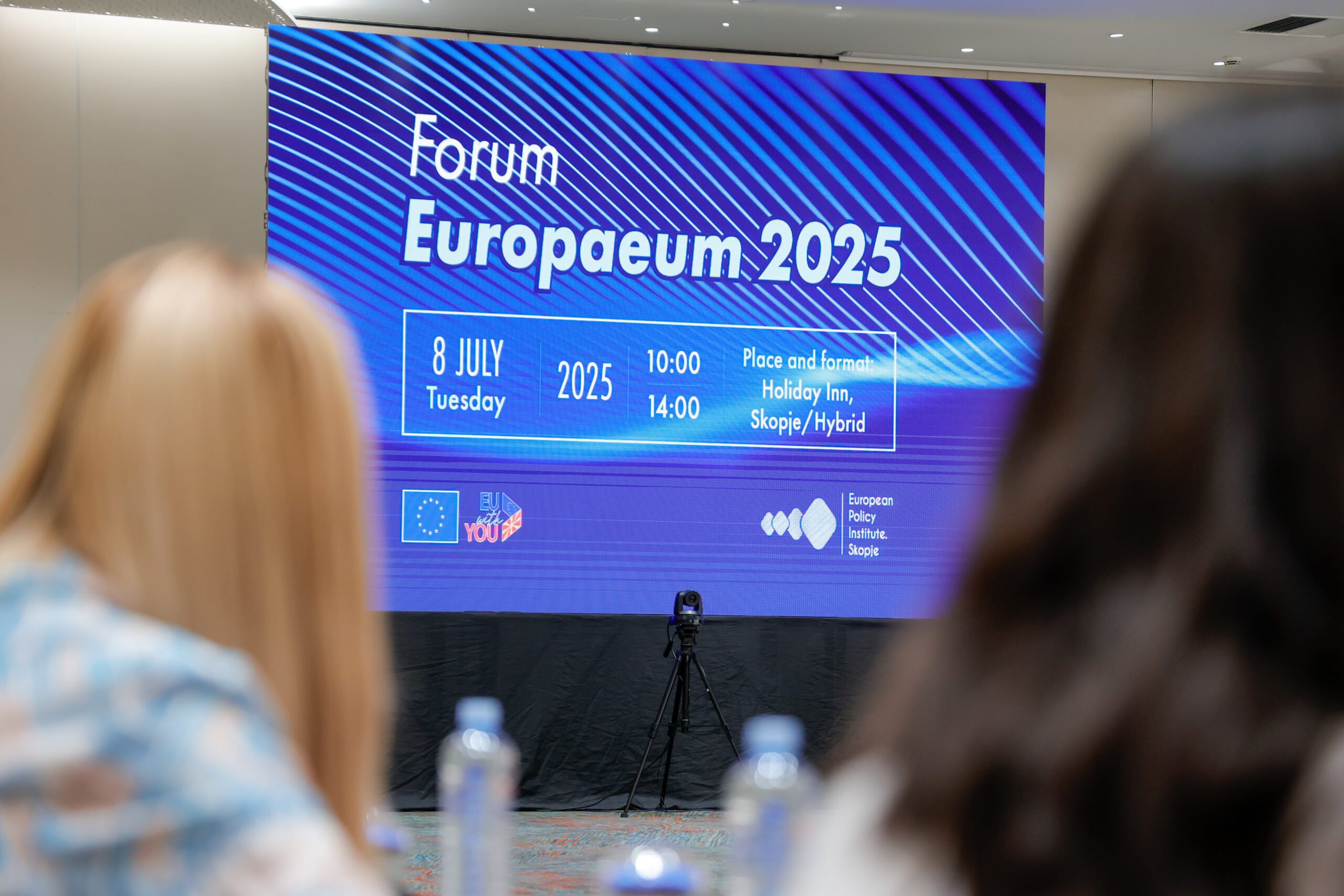At a time of heightened focus on the European Union enlargement and the implementation of the Western Balkans Growth Plan, the European Policy Institute (EPI) – Skopje organized the traditional Forum Europaeum conference on 8 July 2025.
The event was opened by EPI’s Director Simonida Kacarska, Ben Nupnau, Deputy Head of Mission at the EU Delegation to North Macedonia, and H.E. Pernille Dahler Kardel, Ambassador of the Kingdom of Denmark, who highlighted the importance of regional cooperation, the new enlargement momentum, and the EU’s strategic priorities.
“Our aim is to build bridges between key voices on the EU and enlargement,” Kacarska said, emphasizing that this is the 15th anniversary of EPI organizing Forum Europaeum.
The Deputy EU Ambassador called for consensus and building momentum.
“There is a consensus on enlargement and now it is important to seize the momentum. The Growth Plan ensures better integration of the countries of the region. The EU is on your side. The Growth Plan comes with transparency that we have not had before,” Nupnau stressed.
The Danish ambassador stressed that when we talk about enlargement, we are actually talking about security policy.
“Denmark wants to align its presidency of the EU Council with climate goals and enlargement priorities,” stressed Dahler Kardel.
The first panel, dedicated to the current state of play regarding EU enlargement, featured speakers like Ambassador Andrej Lepavcov, State Counsellor at the MEP Hristina Koneska-Beroska, Lukáš Macek from the Jacques Delors Institute in Paris, Berta Lopez Domenech from the European Policy Centre in Brussels and Isabelle Ioannides from ELIAMEP.
“All the shocks that hit the EU, starting with the migrant crisis, the war in Ukraine, but also relations with the US, have made enlargement a goal of the EU. 2025 is an inglorious anniversary for us, it is 20 years of candidate status,” Lepavcov noted.
Koneska-Beroska noted that North Macedonia has been in the enlargement process the longest.
“The reforms that are part of the reform agenda are not new demands. Inclusiveness is also particularly important; the civil sector and the academic community should be included,” she stressed.
Lukáš Macek from the Jacques Delors Institute said:
“Skopje is not the place to explain how complicated France’s relationship with the enlargement process is. For France, the big issue with enlargement is the EU’s global position. That changed drastically after Russia’s aggression in Ukraine. The change was due to two ideas: grey areas and credibility. If the EU does not have enough influence in the region, how can we expect to have a better position globally,” said Macek.
Isabelle Ioannides from ELIAMEP said:
“I am optimistic about the Growth Plan. Overall, I think it is a promising initiative and could potentially be transformative. It is something that we, the experts and the think tanks, have asked the EU for. I believe it is positive that there was a response from the EU on this issue. This Growth Plan aims to help with integration. It will reduce the costs of adaptation. The second point is that the Growth Plan could transform the relationship and communication between the EU and this region. The Growth Plan has put the governments of the region in a position of responsibility. The money from this Growth Plan is not enough, and think tanks have criticized that. The idea is to attract foreign investment, not just financial aid. There is a recognition that enlargement is a security issue, but it will also be a catalyst for democratic reforms. There is a need for commitment to integration, because there are many cases where it will take many years for the region to adapt to the EU countries, so the region should also focus on reforms outside the Growth Plan.”
Berta Lopez Domenech from the EPC pointed out:
“Different countries are pushing for enlargement, some for the countries from the East, some for the Western Balkans, while some are still skeptical.”
The second panel, dedicated to the rule of law as a key pillar of the foundations and negotiations for EU accession, featured Supreme Court Judge Mirjana Lazarova Trajkovska, Advisor at the Ministry of Justice Aleksandra Cvetanovska, Director of the Academy of Judges and Public Prosecutors Irina Trajkoska Strezoski, and Executive Director of the Coalition “All for Fair Trials” Darko Avramovski.
Mirjana Lazarova Trajkovska emphasized that:
“A judge who has integrity, who stands for the rule of law, will not allow themselves to be influenced by public pressure. Every judge should be guided by the law. Respecting the judgments of the ECHR is not only respect for the law, but also respect for fundamental rights.”
Aleksandra Cvetanovska pointed out that:
“The Ministry is working transparently and intensively, in June all laws from the Reform Agenda entered into legislative procedure within the given deadline. Out of 8 laws envisaged by the Reform Agenda, 7 are in government procedure.”
Irina Trajkoska Strezoski explained the initial and the continuous training for candidates of the Academy for Judges and Public Prosecutors and explained the European values that are included in those trainings, and that future judges and public prosecutors are being prepared to apply them.
Darko Avramovski highlighted the shortcomings in the justice sector, namely, the postponement of court hearings, the lack of explanations in court judgments and other aspects that contribute to judicial inefficiency and the low level of citizens’ trust in the judiciary.
The event was organized within the framework of the project “Building bridges for a common future: The rule of law in view of EU accession”, implemented by the European Policy Institute (EPI) – Skopje and funded by the European Union.













